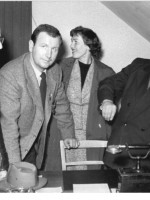Günther Simon is a Actor Allemand born on 11 may 1925 at Berlin (German)

Günther Simon (11 May 1925 – 25 June 1972) was an East German actor.
A bank clerk's son, Simon attended an acting school already in Gymnasium. At the age of 16, he was sent to a premilitary training camp of the Hitler Youth and then drafted to the Reich Labour Service. He volunteered to join the paratroopers in August 1943. He was captured by American troops near Normandy and shipped to a POW camp in Colorado, where he acted in the camp's makeshift theater.
Breakthrough
After returning home in 1947, Simon took private acting lessons with Karl Meixner in the Hebbel Theater. He made his debut on stage in the Municipal Theater of Köthen at 1948, in a production of Dmitry Scheglov's The Storm. He then moved to the Schwerin Theater, in which he remained until 1950; there, he met his wife Margarita, who was employed as a dancer. Afterwards, Simon joined the cast of the Dresden Theater. In late 1951, he left it in favour of the Leipzig Theater, where he remained for only a short period.
Summit
Simon was cast for one of the leading roles in the 1952 film The Condemned Village, and since then was active mainly in cinema. At the same year, in spite of his inexperience, he was chosen to portray Ernst Thälmann in Kurt Maetzig's two-part propaganda epic about the communist leader's life. The picture was watched by millions and entered the East German schools' curriculum. Simon received the National Prize first class for his work on the first part, and the Best Actor Award in the 1956 Karlovy Vary International Film Festival for his appearance in the second. He joined the country's Socialist Unity Party of Germany (SED / Sozialistische Einheitspartei Deutschlands) in 1954 and became a member of the DEFA Studio's management.
Simon appeared in some 30 pictures throughout the years. In 1956, he was awarded the Heinrich Greif Prize second class. He won the National Prize once more, in 1968, for his portrayal of Krause in the television miniseries Krause and Krupp, and received the Art Prize of the Free German Trade Union Federation thrice, in 1967, 1968, and 1971. He had three sons and one daughter, and is buried in the Dorotheenstadt cemetery.
Source : Wikidata
Günther Simon

Nationality German
Birth 11 may 1925 at Berlin (German)
Death 25 june 1972 (at 47 years) at Berlin (German)
Awards National Prize of East Germany
Birth 11 may 1925 at Berlin (German)
Death 25 june 1972 (at 47 years) at Berlin (German)
Awards National Prize of East Germany
Biography
Early lifeA bank clerk's son, Simon attended an acting school already in Gymnasium. At the age of 16, he was sent to a premilitary training camp of the Hitler Youth and then drafted to the Reich Labour Service. He volunteered to join the paratroopers in August 1943. He was captured by American troops near Normandy and shipped to a POW camp in Colorado, where he acted in the camp's makeshift theater.
Breakthrough
After returning home in 1947, Simon took private acting lessons with Karl Meixner in the Hebbel Theater. He made his debut on stage in the Municipal Theater of Köthen at 1948, in a production of Dmitry Scheglov's The Storm. He then moved to the Schwerin Theater, in which he remained until 1950; there, he met his wife Margarita, who was employed as a dancer. Afterwards, Simon joined the cast of the Dresden Theater. In late 1951, he left it in favour of the Leipzig Theater, where he remained for only a short period.
Summit
Simon was cast for one of the leading roles in the 1952 film The Condemned Village, and since then was active mainly in cinema. At the same year, in spite of his inexperience, he was chosen to portray Ernst Thälmann in Kurt Maetzig's two-part propaganda epic about the communist leader's life. The picture was watched by millions and entered the East German schools' curriculum. Simon received the National Prize first class for his work on the first part, and the Best Actor Award in the 1956 Karlovy Vary International Film Festival for his appearance in the second. He joined the country's Socialist Unity Party of Germany (SED / Sozialistische Einheitspartei Deutschlands) in 1954 and became a member of the DEFA Studio's management.
Simon appeared in some 30 pictures throughout the years. In 1956, he was awarded the Heinrich Greif Prize second class. He won the National Prize once more, in 1968, for his portrayal of Krause in the television miniseries Krause and Krupp, and received the Art Prize of the Free German Trade Union Federation thrice, in 1967, 1968, and 1971. He had three sons and one daughter, and is buried in the Dorotheenstadt cemetery.
Usually with
Filmography of Günther Simon (33 films)
Actor

The Dress (1991)
, 1h28Directed by Egon Günther, Konrad Petzold
Genres Comedy
Actors Wolf Kaiser, Günther Simon, Harry Riebauer
Roles Fleischer
Rating64%






Ripe Cherries (1973)
, 1h30Directed by Horst Seemann
Genres Drama
Actors Günther Simon, Ivan Pereverzev, Hertha Thiele
Roles Helmut Kamp
Rating65%






Sun Seekers (1972)
, 1h54Directed by Konrad Wolf
Genres Drama
Actors Günther Simon, Erwin Geschonneck, Vladimir Yemelyanov, Manja Behrens, Viktor Avdyushko, Brigitte Krause
Roles Franz Beier
Rating63%





1950. After being arrested in a police raid, the two young prostitutes Lotte and Emmi are sent to the mines in Wismut. There, Germans and Soviets work together to extract Uranium for the use of the USSR. Two men fall in love with Lotte: the director Beier, a former SS man who tries to compensate for his past with hard work, and the Soviet engineer Sergei, whose wife was murdered by the Germans in the war. In the meantime, Jupp König, a veteran communist whom Emmi once harbored from the Gestapo, leads the miners as they attempt to replace their harsh and incompetent party boss, Weihrauch. Eventually, König is given Weihrauch's office. Lotte marries Beier, although she later realizes that she loves Sergei. When her husband is badly injured in an accident, he confides to the Soviet engineer that soldiers from his battalion murdered the latter's wife; Sergei replies that he knew it all along. Lotte and her baby son leave the mines and return to Berlin.
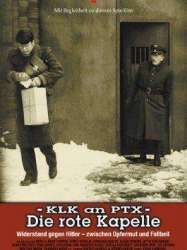 , 1h41
, 1h41Directed by Horst E. Brandt
Genres Drama, Historical
Themes Spy films, Political films
Actors Jutta Wachowiak, Karin Lesch, Siegfried Weiss, Günther Simon, Peter Sturm, Rudolf Ulrich
Roles John Sieg
Rating73%





After Hitler's rise to power in 1933, a group of regime opponents from various backgrounds consolidated under the leadership of Harro Schulze-Boysen and Arvid Harnack. They gather intelligence and pass it on to other countries. After the outbreak of the Second World War, and especially after the German invasion of the Soviet Union, they intensify their work. In August 1942, the Gestapo arrests Boysen and soon after cracks down on the spy ring.
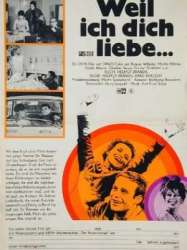
Weil ich dich liebe... (1970)
Genres Drama
Actors Ursula Werner, Helga Göring, Jürgen Frohriep, Günther Simon
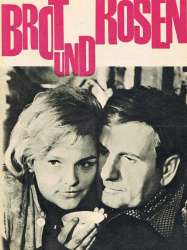
Bread and Roses (1967)
, 1h43Directed by Horst E. Brandt, Heinz Thiel
Genres Drama
Actors Günther Simon, Carola Braunbock, Helga Göring, Jürgen Frohriep
Roles Georg Landau

Alfons Zitterbacke (1966)
Directed by Konrad Petzold
Genres Comedy, Adventure
Themes Children's films
Actors Günther Simon
Roles Vater Zitterbacke
Rating65%






Reise ins Ehebett (1966)
Genres Comedy, Musical, Romance
Actors Anna Prucnal, Günther Simon
Roles Kapitän
Rating54%






Der Reserveheld (1965)
Genres Comedy
Actors Rolf Herricht, Günther Simon, Carmen-Maja Antoni
Roles Oberst
Rating58%






The Song of the Trumpeter (1964)
Directed by Konrad Petzold
Genres Drama
Actors Jürgen Frohriep, Helga Göring, Rolf Römer, Hannjo Hasse, Günther Simon, Horst Giese
Roles Ernst Thälmann
Rating63%





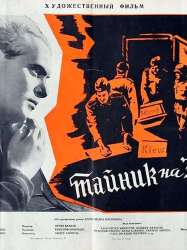
Secret Archives on Elbe (1963)
, 1h20Directed by Kurt Jung-Alsen
Genres War, Adventure, Spy
Themes Spy films, Political films
Actors Albert Hetterle, Günther Simon, Rudolf Ulrich, Helga Göring, Adolf Fischer, Kurt Jung-Alsen
Roles SS-Gruppenführer Upitz
Rating60%





Peu avant la fin de la Seconde Guerre mondiale. Le gruppenführer Upitz sait que la guerre est bientôt terminée. Il cherche à tirer profit de ce moment et accepte une offre des Américains. Il obtiendra l'impunité s'il leur remet les archives secrètes de la Gestapo qui sont cachés à Meißen, le long de l'Elbe. Elles regroupent toutes les données sur les agents présents en Union soviétique et dans les Balkans. Mais le contre-espionnage soviétique est aussi à la recherche de ces archives, Upitz les mène vers une fausse piste.

At a French Fireside (1962)
, 1h39Directed by Kurt Maetzig
Genres Drama
Themes Political films
Actors Angelica Domröse, Hannjo Hasse, Günther Simon
Roles General Rucker
Rating65%





Bundeswehr soldier Klaus' regiment is stationed in France, to take part in NATO maneuvers. The soldiers are ordered to be kind to the populace, since the West German High Command wishes the French to forget the atrocities that were committed during the Second World War. Klaus falls in love with Jeanne, the daughter of the local mayor. He discovers that his commanders intend to demolish the ruins of a local church, in which civilians were murdered by the German occupation forces at 1944. A local journalist who researches the event discovers that West German General Rucker ordered the massacre, but he is mysteriously murdered. Klaus defies his commanding officer Siebert, who instructs him to steal the documents indicting Rucker, and hands the evidence over to Jeanne.
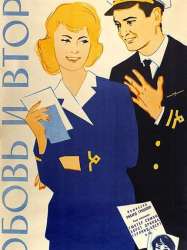
Die Liebe und der Co-Pilot (1961)
Genres Comedy, Romantic comedy
Themes Transport films, Aviation films
Actors Günther Simon, Jürgen Frohriep, Brigitte Krause, Angelica Domröse, Rudolf Ulrich, Werner Dissel
Roles Richard Wagner, Kommandant
Rating46%





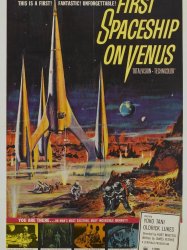
First Spaceship on Venus (1960)
, 1h33Directed by Kurt Maetzig
Origin Pologne
Genres Drama, Science fiction, Adventure
Themes Space adventure films, Films about music and musicians, Films set in the future, Films about extraterrestrial life, Musical films, Space opera, Venus in film, Films about extraterrestrial life, Alien invasions in films, Disaster films
Actors Günther Simon, Eduard von Winterstein, Yoko Tani, Lucyna Winnicka, Ruth Maria Kubitschek
Roles Robert Brinkmann, deutscher Pilot
Rating46%





The film begins in 1985, when engineers involved in an industrial project to irrigate the Gobi Desert accidentally unearth a mysterious and apparently artificial "spool". When found to be made of a material unknown on Earth, the spool is circumstantially linked to the Tunguska explosion of 1908. The "spool" is seized on as evidence that the explosion, originally blamed on a meteor, was actually caused by a spaceship. Professor Harringway deduces the alien craft must have come from Venus. The spool itself is determined to be a flight recorder, and partially decoded by an international team of scientists led by Professor Sikarna and Dr. Tchen Yu. When radio greetings sent to Venus go unanswered, Harringway announces that a journey to Venus is Earth's only alternative. The recently completed Soviet spaceship Cosmostrator I (Kosmokrator in the original), intended to voyage to Mars, is redirected to Venus, a 30–31 day trip. During the voyage, Sikarna works furiously to translate the alien message on the disc using the ship's computer.
 Connection
Connection
